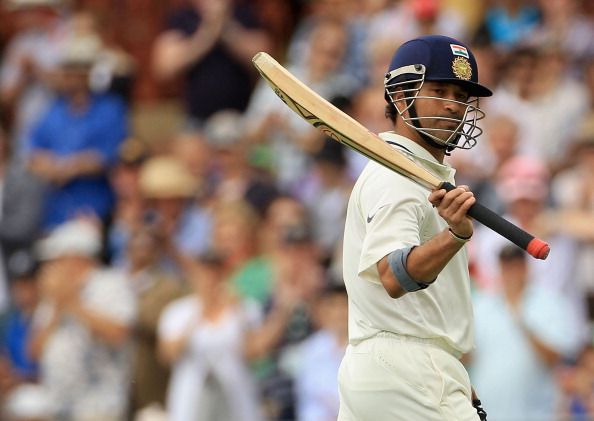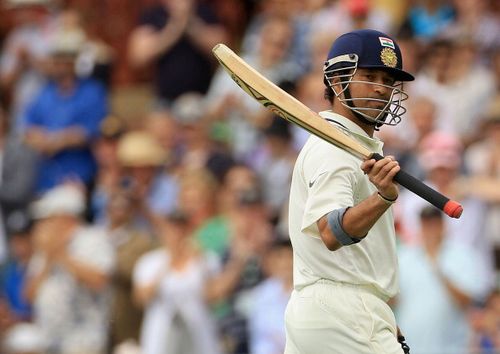
Debunking the 'Sachin Tendulkar not a match-winner' myth

When you look back at the illustrious career of Sachin Tendulkar, you will have to use your magnifying glass to find chinks in his armour. In case that doesn’t work, you have to resort to using a microscope. You shouldn’t be surprised if the result still yields nothing. The proverb ‘finding needles in a haystack’ is not for nothing. The fact that a player of his stature has hardly courted a controversy in 24 years of international cricket is as appalling as his list of centuries; add to it, the fact that he owns virtually every batting record worth owning makes the haystack as big as the Eiffel Tower, and needles as small as a mustard seed.
Perhaps, the only topics that remain up for discussion are that a lot of his hundreds came in losing causes and that he did not play when it mattered. Strange to say that he did not play when it mattered when stats say that he is literally the best. But more on that later.
Let us have a look at these points in two aspects: statistical and analytical.
An analytical explanation is provided at first. If you still do not agree, a statistical explanation follows that, as well. There is a common belief that statistics do not give the correct picture. However, I have a firm belief they do, if analyzed in the correct manner. In any case, both the aspects have been taken into account.
A) Tendulkar and Hundreds
#1 Tendulkar and Test Hundreds
The very basis of the argument that India always lost when Tendulkar scored a hundred is flawed. When a player scores a century, more often than not, he would be the best player in that innings. You simply cannot blame the player who played out of his skin, for a loss. The only logical explanation for this argument is that Tendulkar played slowly in LOIs, and hence Team India lost, which would be disproved later in this piece, anyway.
But let us first start with Tests.
Imagine that there was a bad king. He did nothing for his kingdom. One day, the minister had enough. He tried to make the kingdom a better place to live in. He did all the hard work, bore the burden of the kingdom but, in the end, failed to bring about a change. The people blamed the minister for failing and said nothing about the bad king.
This story makes any sense to you?
Sachin Tendulkar scores a 100. India loses a Test match. This is, for some godforsaken reason, is synonymous with ‘Sachin Tendulkar scores a century, and hence India loses the Test match’.
What is Tendulkar’s fault in Tests if his century is in a losing cause? It’s like Usain Bolt running the fastest among a four member team in a relay, and, if it still was not enough, he is to take the blame for the defeat. If the bowlers did not back him up, it is hardly his fault that the team lost, unless there was the expectation that he should have bowled his leggies and taken a couple of hat-tricks.
A Test match can be won only when 20 wickets are taken. A batsman can hardly be blamed if the bowling team fails to do so. The fact that 20 Test matches have ended in a draw when this little man had scored a century is also proof of the fact that he has done what is realistically possible with the bat: snatched a draw from the jaws of defeat. Let us look at a few of these.
- His very first Test hundred, a fighting one at Old Trafford, in which he came to bat at 109 for 4, with 4 hours still left to play, is a testament of the fact. He lost two other wickets pretty early down the road, but held on to prevent an obvious loss.
- The fighting 111 against South Africa in Johannesburg, 1992, when the second-highest score by an Indian was 25 and 43, first and second innings respectively, in the match.
- His 126 along with Rahul Dravid’s 144 in the second essay, at Chandigarh, 1999, when India had folded for 83 in the first innings.
- Having conceded a lead of 139 to West Indies in Eden Gardens, India were tottering at 11-2 when Tendulkar came in to bat. Soon it became 49-3 and 87-4. The Master Blaster combined with VVS Laxman to stitch together a 214-run partnership and take the match beyond the realm of defeat.
Coming to losses, how can a player who has played out of his skin be blamed for the loss? As stated earlier, the brunt of the defeat has to be borne by the bowlers. A way of explaining this is as follows:
The average runs conceded by the Australian bowlers while Ricky Ponting batted for them was 28.96. The corresponding figure for Indian bowlers with Tendulkar in the side was 35.35. In other words, in an innings when 10 wickets fell, Australian bowlers conceded around 70 runs less. In two innings of a Test, the figure is close to 140 (safe to assume in a losing cause the 10 wickets would have fallen more often than not). Assuming Tendulkar had those bowlers, it would have changed the outcome from defeats to victories.
A very simple table can show to an extent what was Tendulkar’s contribution, and what was the other team members’ contribution. Bear in mind that this is equivalent to a fool’s errand, as he has to be among the top most scorers if he is scoring a 100. The second highest scores are bound to surprise you, though.
| Match Details | Tendulkar’s Score | Highest Score in the Match by an Indian | 2nd Highest score in the match in case of Tendulkar having the highest score |
|---|---|---|---|
| India v/s Australia | 114 | 114 | 38 |
| India v/s England | 122 | 122 | 52 (by Javagal Srinath) |
| India v/s South Africa | 169 | 169 | 115 |
| India v/s Australia | 177 | 177 | 74 |
| India v/s New Zealand | 113 | 113 | 103 |
| India v/s Pakistan | 136 | 136 | 54 |
| India v/s Australia | 116 | 116 | 52 (by Tendulkar himself) else 45 |
| India v/s South Africa | 155 | 155 | 105 |
| India v/s Australia | 154 | 154 | 109 |
| India v/s South Africa | 100 | 109 (The first time someone scored more than him) | |
| India v/s South Africa | 111 | 111 | 80 |
This table proves the exact opposite: In the matches India lost when Tendulkar had scored a century, it was the team’s contribution that was lacking, and the Master was waging a lonely battle. If anything, this proves the greatness of the champion player rather than the fact that he was found wanting. He was the second-highest scorer only once and, at times, was miles ahead of the second-most scorer.
Is it Tendulkar’s fault that he shone when others faltered?
Let us, for a minute, assume that this criterion of evaluating the percentage of centuries in winning causes to the overall figure is correct. This would mean that Tendulkar, who has a winning percentage of 39.22, is not a better batsman than Ian Bell, Graeme Smith, Thilan Samaraweera, Ashwell Prince and even Simon Katich!
Also, it would mean the above mentioned players are better than Sir Gary Sobers, Brian Lara, Micheal Clarke and Ian Botham.
And this would make Allan Border, Sunil Gavaskar, Martin Crowe and Hanif Mohammed the worst players of all time!
Still think this method of evaluating a player is correct?
The fact that these players scored centuries when others could not get their bat on ball shows that they were in weaker sides and just too good. For some unknown reason, it is taken to be the other way round!
Do you now still feel it was Tendulkar’s fault that India lost when he scored a century?